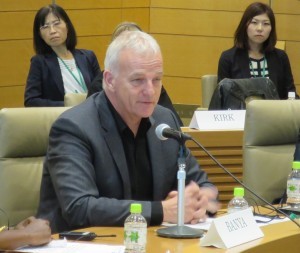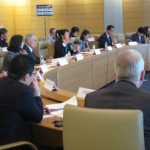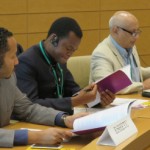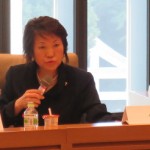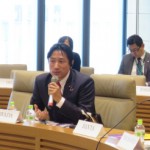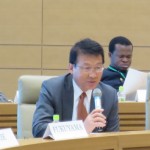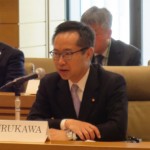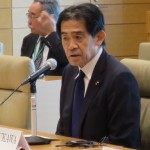During an October 2015 visit to Japan by Global Fund Director for Strategy, Investment, and Impact Dr. Osamu Kunii, FGFJ organized a joint meeting of its Diet Task Force and Advisory Board, bringing together 61 participants including policymakers, domestic and international NGO leaders, and experts from civil society and academia.
17 Million Lives Saved
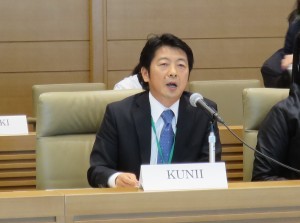 Dr. Kunii offered a look at the impact and results that the Global Fund and its partners have achieved since its establishment in 2002. Key impacts include one third fewer deaths from AIDS, tuberculosis, and malaria in countries where the Global Fund invests, totaling 17 million lives saved.
Dr. Kunii offered a look at the impact and results that the Global Fund and its partners have achieved since its establishment in 2002. Key impacts include one third fewer deaths from AIDS, tuberculosis, and malaria in countries where the Global Fund invests, totaling 17 million lives saved.
To put things in context, the Ebola epidemic has been a game changer for the global health field, claiming 10,000 lives in just over one year, However, HIV/AIDS, tuberculosis, and malaria claim roughly the same number of lives daily in Africa. Dr. Kunii pointed to this as an indication of the continued severity and persistence of these three disease epidemics.
He called for continued funding for the Global Fund as efforts to control the spread of the three diseases have reached a critical juncture. Decreased funding at this stage will set us back in our timeline toward control over the three diseases and may lead to their reemergence, rendering all of our efforts and investments thus far a waste.
While applauding Japan for making global health a top priority, Dr. Kunii pointed out that Japan only allocates 3% of its bilateral ODA for health, medicine, and population which is significantly lower than the 35% of ODA devoted by the United States, 10% by the United Kingdom, and 32% by Canada. He emphasized that in order to create an international global health movement, Japan needs to strategically allocate ODA to reflect its priorities.
The Global Fund Gave Me A Second Chance at Life
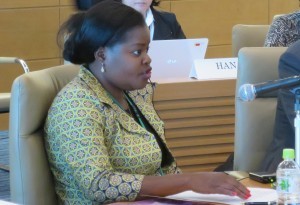 Visiting Japan from Malawi on an invitation from Africa Japan Forum, Clara Banya then spoke about her personal experiences with the three diseases. At 25 years old, she was informed that she had contracted AIDS. Her husband and daughter are both HIV positive and have multidrug-resistant tuberculosis. “For many Malawians who live on less than 1 dollar a day, antiretroviral therapy is simply unaffordable. Thanks to support from the Global Fund, my family and I were given a second chance at life.” She strongly emphasized that the Global Fund’s support is essential to the individuals, families, and communities living with the three diseases.
Visiting Japan from Malawi on an invitation from Africa Japan Forum, Clara Banya then spoke about her personal experiences with the three diseases. At 25 years old, she was informed that she had contracted AIDS. Her husband and daughter are both HIV positive and have multidrug-resistant tuberculosis. “For many Malawians who live on less than 1 dollar a day, antiretroviral therapy is simply unaffordable. Thanks to support from the Global Fund, my family and I were given a second chance at life.” She strongly emphasized that the Global Fund’s support is essential to the individuals, families, and communities living with the three diseases.
Now, as the National Coordinator for the International Community of Women Living with HIV (ICW Malawi Chapter), Clara supports groups of people living with HIV by encouraging testing, fighting against stigma and discrimination, and speaking publicly about AIDS in Malawi. She feels empowered to share her experiences to help in policy development and resource mobilization in Malawi and around the world.
The executive director of International Civil Society Support (ICSS), Peter van Rooijen, spoke about the importance of the Global Fund to NGOs engaged in advocacy for the three diseases. The Global Fund reserves 2 out of its 20 board seats for NGOs in order to ensure that civil society has a voice in its decision making process. Mr. van Rooijen stated that as the only funding mechanism that directly supports NGOS and community organizations in the global health field, the Global Fund’s cooperation with civil society is essential in the global effort to deliver medical services to those who desperately need it.
Japan’s Initiative
The co-chair of the FGFJ Diet Task Force, Representative Ichiro Aisawa, expressed his appreciation for the Global Fund by acknowledging that focused effort to eliminate the three diseases have contributed a great deal toward achieving the Millennium Development Goals. However, he also warned that increased attention toward the refugee crisis should not lead to decreased support to regions fighting against the three diseases.
Meanwhile, Representative Motohisa Furukawa, who is the other co-chair of the FGFJ Diet Task Force, spoke about the need for continued funding for the Global Fund. With the Global Fund Preparatory Replenishment Meeting taking place in Japan in December and the G7 summit in 2016, he felt it was important for Japan to take the initiative in highlighting the significance of the Global Fund and playing a greater role in promoting it.


